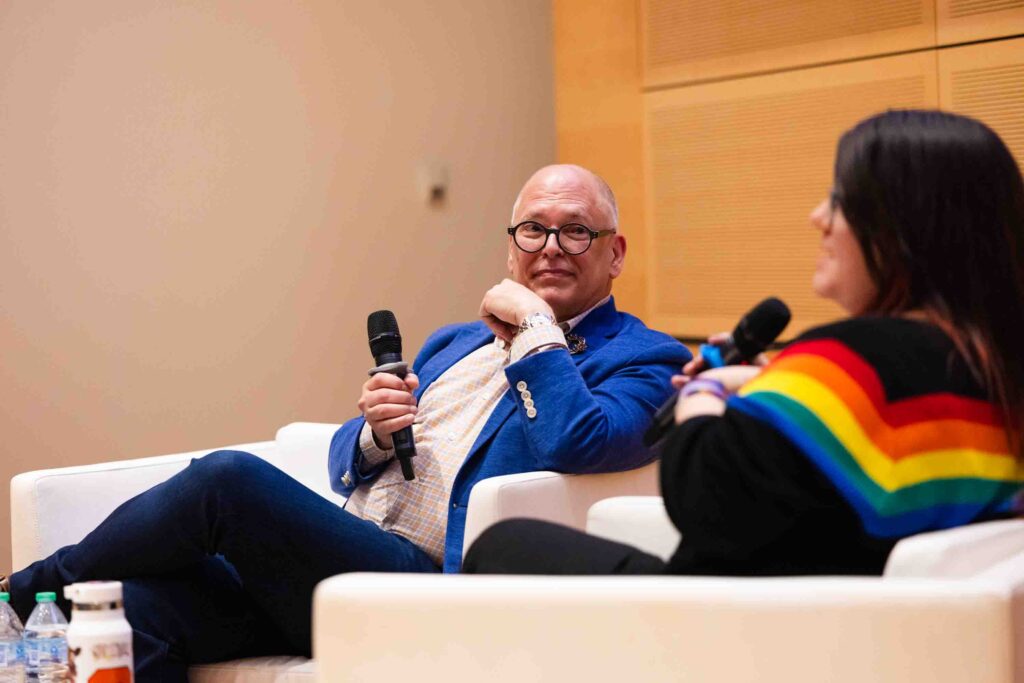‘Love, Loss and Law’: James Obergefell tells story behind historic Supreme Court case
James Obergefell tells story of historic Supreme Court case at SU
Obergefell spoke at the Newhouse School to discuss how he turned love into a fight for equality.

James Obergefell, the main plaintiff in the landmark 2015 Supreme Court case Obergefell v. Hodges, which legalized same-sex marriage nationwide, shared a personal story of love, loss and the law on October 29 at Syracuse University.
In the Joyce Hergenhan Auditorium at the S.I. Newhouse School of Public Communications, the event drew both SU and SUNY Environmental Science and Forestry students to hear from one of the key figures behind one of the most significant civil rights decisions in recent history.
The event was part of the Potash Speaker series, hosted by the Maxwell School of Citizenship and Public Affairs, Newhouse School and the Intercultural Engagement Office. It was one of the final events in a series celebrating LGBTQ+ History Month.
The legal battle began with a simple marriage license and a death certificate. When Obergefell’s husband, John Arthur, who was suffering from ALS, neared the end of his life, Obergefell learned from a lawyer and friend that Ohio would not recognize their marriage on Arthur’s death certificate.
“I got to take the stand and look this judge in the eye and talk about what John meant to me,” Obergefell said. “The state we called home, where I was born and raised, would ignore us and fill out John’s death certificate incorrectly.”
For many students in attendance, Obergefell’s words served as a reminder of the progress made by the LGBTQ+ community as well as a call to action to continue to fight through the current political atmosphere.
“I think knowing that people like Jim still exist is really hopeful,” Mia Jordanich, a human development and family science sophomore, said. “Especially during what’s happening right now with our president and how the Supreme Court keeps trying to get between the LGBTQ+ community and their right to marry.”
Throughout his talk, Obergefell focused on the unexpected ways people might become allies and fellow advocates.
“I think it’s also important to recognize and honor those who are allies, especially those that we don’t necessarily assume are allies at first,” Obergefell said. “The Attorney General did not come to Cincinnati to argue when I went to court from the very first hearing in federal district court.”
Obergefell thought of himself as a “quiet activist” who had no initial intention of becoming well-known.
“This case feels like the accidental part,” Obergefell said. “But now that I’ve had this experience, I’m a full-time activist because I understand what it’s like to be a part of something that genuinely improves the world.”
During a Q&A session, Obergefell reflected on his impact on marriage equality.
“I had one young woman tell me that if it weren’t for marriage equality, she would have committed suicide,” Obergefell said. “She saw no future for herself, and for the first time in her life as a closeted queer kid, marriage equality gave her a future that she could see.”
Christine Gibson, a sociology student, said the lecture reassured her confidence in attending law school post-graduation.
“It’s a reminder that law school is a great tool to have,” said Gibson. “Law is a great tool to have in changing the atmosphere, to create the change you want to see.”
Obergefell left the students with a message of determination to the audience.
“It’s a right that we all deserve,” Obergefell said. “Because if we can’t love someone and have that love respected, then honestly, what’s the point of anything else?”
